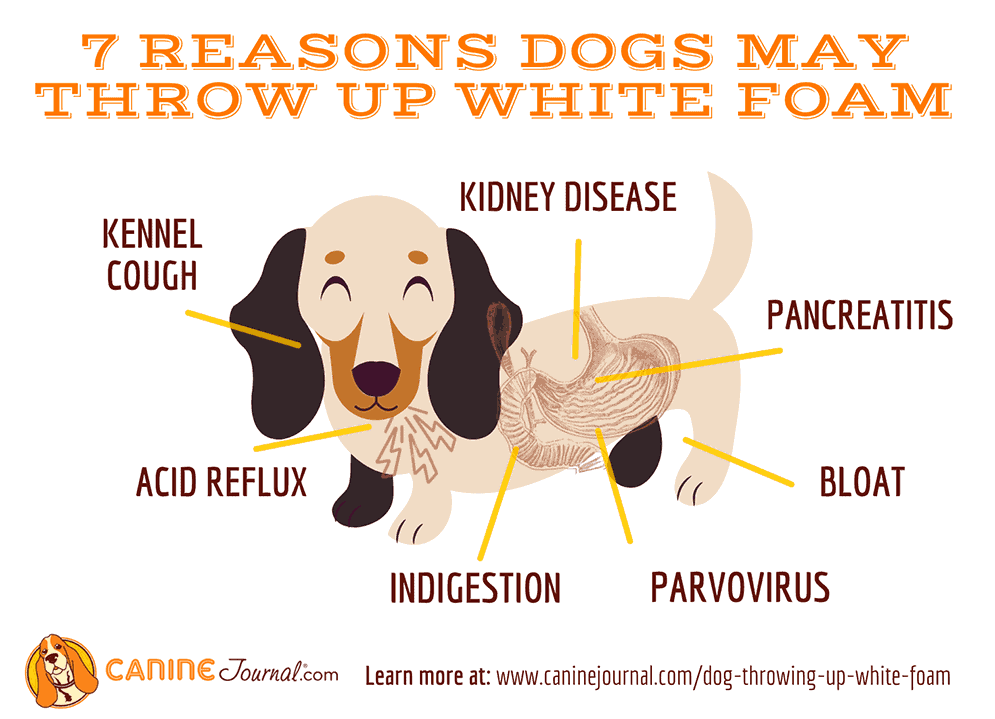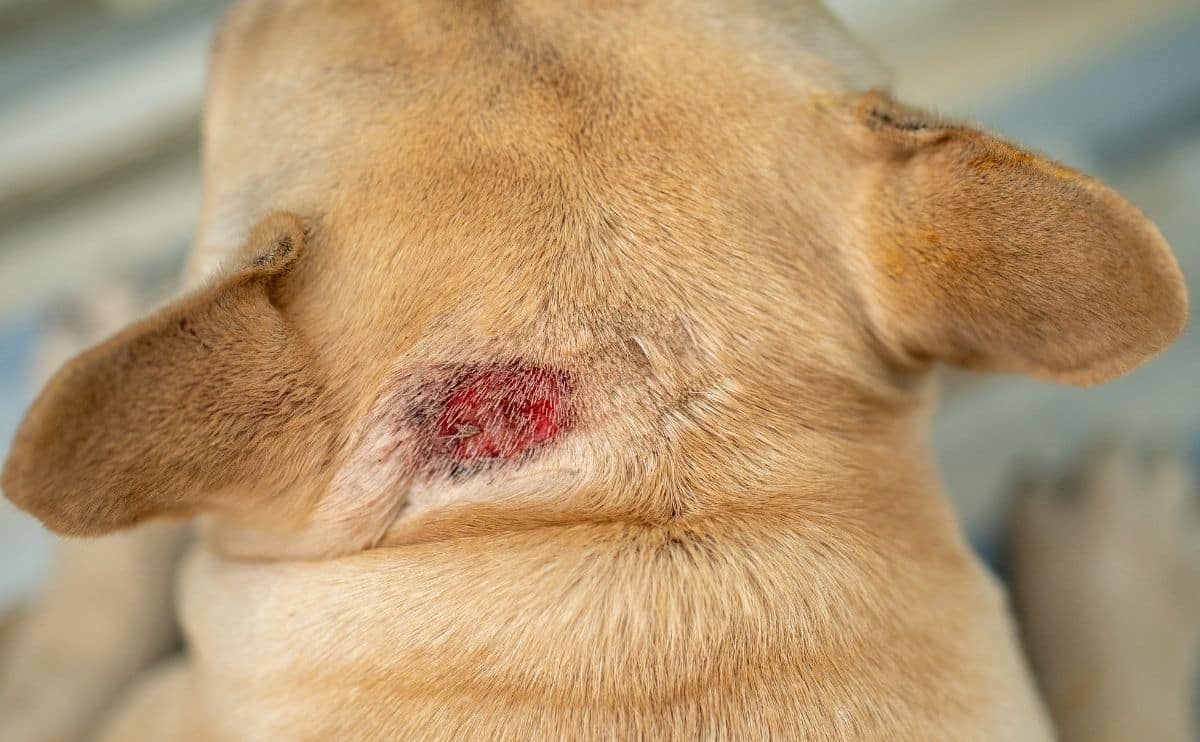My Dog Is Throwing Up White Foam: Do I Need To Worry?
When you purchase through links on our site, we may earn a commission. Here’s how it works.
Periodic dog puke is practically a given when you’re a pet parent. Aside from the hassle of having to clean it up, should you be concerned when your dog spits up white foam? Find out what a dog vomiting white foam means, seven possible causes, treatment options, and how to prevent it.
Table of Contents

What Should I Do If My Dog Vomits White Foam? (When To See The Vet)
If your dog is a puppy, a senior, or has underlying health problems, you should see your veterinarian immediately if she’s throwing up a lot of white foam or another vomit color. Puppies and senior dogs have relatively weak immune systems, so constant vomiting of white foam could wreak havoc on their bodies and make them quite ill. For dogs with underlying health problems, the vomiting could worsen those other health problems or be a sign that those issues are not under adequate control.
In addition to identifying a severe underlying condition, your vet can treat your dog for dehydration from vomiting.
If your adult dog is otherwise healthy and only occasionally spits up white foam, it’s likely just regular indigestion. Dogs don’t tend to be picky eaters, so it wouldn’t be surprising if your dog ate something that upset their tummy.
You should see your vet to rule out any medical problems if the vomiting episodes become more frequent or your dog exhibits other symptoms or is behaving abnormally. While a dog vomiting white foam is not usually something serious, it’s crucial owners take note of any other symptoms. Nor is throwing up white foam something your dog should do every day.
How Do I Treat My Vomiting Dog At Home?
This three-minute video from Doctor Lindsey talks about how you can treat your dog for vomiting at home.
Why Is My Dog Throwing Up White Foam?
There are lots of reasons your dog may be throwing up white foam. Our experts put together this list of seven causes you may need to consider.
NOTE: In most cases, a dog vomiting white foam isn’t a cause for serious concern. However, sometimes it could require a visit to your vet for your dog, especially if she has other symptoms.
1. Indigestion
Indigestion, also known as dyspepsia, really just means an upset stomach and is the most common cause of a dog throwing up white foam. Dogs get indigestion just like humans, but they throw up a lot more frequently. In most cases, throwing up white foam is due to your dog’s body trying to get rid of a substance that’s upsetting her stomach.
Owners often notice dogs throwing up white foam after eating grass. The grass is difficult to digest, so it often comes back up. Dogs vomiting white foam after eating grass is a common occurrence. It could be that your dog ate too much grass, wolfed down her food, or ate and drank excessively right after exercising. As long as your dog isn’t vomiting consistently, she’s likely just experiencing regular indigestion.
Personal Experience With Dog Eating Grass And Throwing Up Foam
“My dog Daisy is about 12 years old and loves to eat grass. She often does this and will vomit up frothy white foam and grass shortly after. Sometimes she eats the grass to help settle her stomach but will overdo it causing white foamy vomit. We have added extra fiber to her food, as well as an indoor patch of potted grass to try and discourage her from gobbling up the wild grass outside.”
–Danielle DeGroot, Canine Journal
2. Acid Reflux
Is your dog vomiting white foam in the morning before eating? It could mean she has reflux gastritis, also called acid reflux. This condition occurs when bile that’s in your dog’s intestines after a meal moves backward into the stomach after a long period of not eating (e.g., overnight). This bile irritates your dog’s tummy, leading to acid reflux (sometimes called ‘bile reflux’). Dogs suffering from acid reflux often vomit white or yellow foam. This condition is called bilious vomiting syndrome.
Tip: Reducing the portions while increasing the frequency of your dog’s meals can help prevent bile from entering your dog’s stomach, which can ultimately lessen digestive problems down the road.
3. Kennel Cough
If your dog has recently been in close quarters with other dogs and is now coughing up white foam, she may have contracted kennel cough. This upper respiratory infection is very contagious but is mild and usually clears up on its own in 7-10 days.
Kennel cough is usually easy to diagnose as its primary symptom is a pronounced hacking or honking cough (aka ‘goose honk’) that can produce white foam. Other symptoms include a runny nose, sneezing, lethargy, and a loss of appetite.
Tip: Before boarding your dog or taking them to the groomer or dog park, make sure they have the Bordetella vaccine. This vaccine can protect against kennel cough, which is caused by the bacteria Bordetella bronchiseptica.
4. Bloat
A severe condition, bloat most commonly occurs in deep-chested adult and senior dogs. Bloat causes a dog’s stomach to fill with gas, fluid, or food, making it expand. One of its early symptoms is a dog spitting up white foam.
Besides an enlarged abdomen and vomiting white foam, dogs will suffer several other symptoms from bloat, including the inability to defecate, pale gums, excessive drooling, and coughing.
If you suspect your dog has bloat, take her to your vet immediately. Without treatment, dogs can die from bloat because the enlarged abdomen can restrict blood flow to your dog’s heart and put pressure on the lungs, making breathing difficult.
5. Pancreatitis
Pancreatitis causes inflammation in the pancreas, an organ that’s vital for healthy digestion in mammals. Dogs suffering from pancreatitis throw up their food frequently, and this vomit could include white foam.
Other symptoms include a hunched back, abdominal pain, diarrhea, loss of appetite, weakness, and dehydration. If you notice all or some of these symptoms, take your dog to the vet as soon as possible.
6. Kidney Disease
A dog throwing up white foam, accompanied by problems urinating, lethargy, and disorientation, could be suffering from kidney problems. Kidney disease in dogs is either acute or chronic. Acute kidney disease is usually caused by ingesting something toxic and often requires immediate and aggressive treatment. Chronic kidney disease develops over months to years and is managed with diet and various medications.
If you notice the symptoms listed above, take your dog to your vet, who will perform blood work and other tests to evaluate your dog’s kidney functions.
7. Parvovirus
Parvovirus (aka Parvo) is a highly infectious and potentially deadly virus that typically affects puppies and very young dogs. One of the initial symptoms is white foamy vomit. Other symptoms include bloody diarrhea, lethargy, and a fever.
Parvovirus in puppies and young dogs can cause a fatal illness in as little as two to three days. So, a dog with a parvovirus infection requires immediate veterinary treatment.
7 Possible Causes For Dog Throwing Up White Foam Infographic

Dog Vomiting White Foam Treatment At Home
If you suspect your dog is just having indigestion from an upset stomach, the best thing you can do to treat is to make sure they stay hydrated. It might be a good idea to keep them on a bland diet of rice and boiled (unseasoned) chicken for a day or two until they recover. But if you have any concerns about bigger health issues, call the vet to discuss your dog’s symptoms.
How Can I Prevent My Dog From Throwing Up?
Though you can’t always prevent vomiting, here are some things you can do to limit it as much as possible.
- Keep your dog’s space free from things she shouldn’t eat by clearing the floor and placing tempting objects out of reach
- Discourage your pup from eating grass and plants outdoors (also see which plants are poisonous for dogs)
- Choose healthy dog food and treats
- Don’t give too many treats throughout the day
- Consider the benefits of CBD oil or treats for digestion concerns
- Take your dog for her annual checkup to stay on top of potential concerns
What Foods Should I Avoid Feeding My Dog?
Many people don’t realize that some common human foods are dangerous for dogs (and cats). Make sure you’re not feeding them human foods that are toxic for dogs.
If you suspect your dog has eaten a potentially harmful food or substance, read our guide on how to treat a poisoned dog. But if your pup only has the occasional upset stomach, be sure to discuss it with your vet and check out our tips to cure your dog’s upset stomach.



